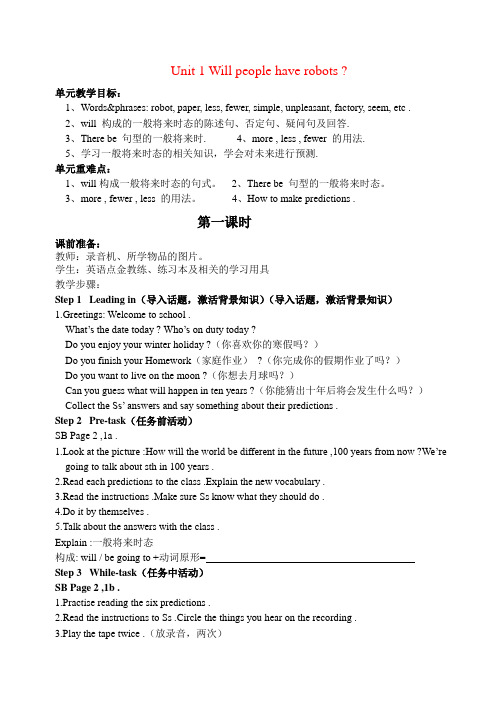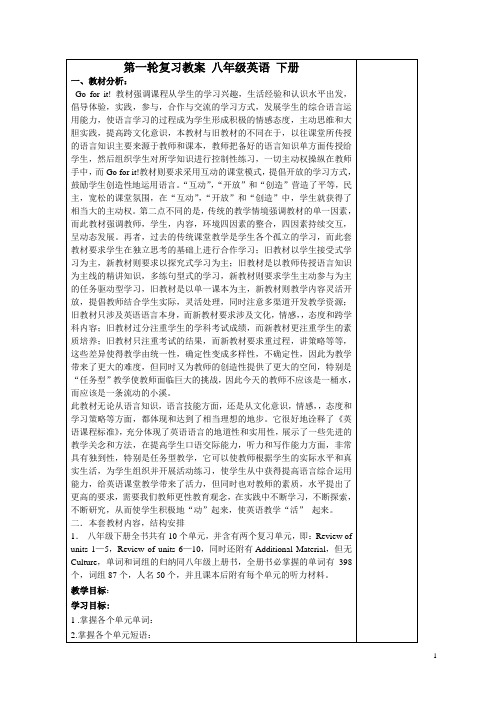新目标九年级英语中考第一轮复习教案八年级下册全册教案
- 格式:docx
- 大小:48.60 KB
- 文档页数:24

第30课时课题:9年级(U11-14)一、目标:1. 能运用“使役动词make ”带“去to 不定式”和形容词作“宾语补足语”的基本用法;2. 能理解“过去完成时态”的基本用法;3. 识记下列重点单词和短语:(U11)drive, examine, weight, courage, agreement, drive sb. mad, the more …the more, be friends/f riendly with sb., neither...nor …, to start/begin with, be hard on sb./be strict with sb.; (U12) backpack, ring, worker, above, alive, airport, till/until, west, market, fool, lady, officer, by the time …, give sb. a lift, in line with, show up, by the end of, sell out; (U13)bottom, coal, ugly, advantage, cost, gate, bottle, president, be harmful to, at the top of, turn off, pay for, take action, throw away, bring back; (U14) survey, row, keyboard, double, shall, ours, senior, text, manager, gentleman, congratulate, thirsty, look back at, go by, first of all, be thankful to sb., ah ead of, along with, set out二、重点:1. “动词不定式一般式to + v .”作“宾语补足语”时带不带“to ”的用法;2. 理解“过去完成时态”表示 “过去的过去”的用法:三、知识梳理:1. 词汇:(1)职业名称: 演员 主席/女主席 厨师 导演 医生 司机 农夫 actor chairman/-womancook director doctor driver farmer 领导 主人/师傅 经理 军官 物主乘客先锋 leader master manager officer owner passenger pioneer 邮递员警察/女警察总统/校长 囚犯 学生 科学家 秘书 postman policeman/-woman president prisoner pupil scientist secretary士兵 陌生人 学生 老师 侍者 工人soldierstrangerstudentteacherwaiterworker地址 机场 区域 军队 澡堂卧室建筑物addressairportareaarmybathroom bedroom building中考一轮 复习教学参考资料2. 句型与语法:(1)使役动词make的两个用法:五、巩固练习:(一)词汇练习(略)1.英汉互译下列单词:(1)职业名称:士兵老师侍者工人stranger student(2)最常用表“处所”的名词:卧室address airport area army bathroom building 首都电影院教室ceiling coast college company国家农场concert corner countryside floor gym 医院湖泊陆地图书馆heaven kitchen lab(oratory)会议博物馆办公室公园market nature palace运动场餐馆河流房间学校place pond剧院村庄世界动物园supermarket toilet university(3)表示“感觉、感情”方面的形容词:生气的兴奋的angry crazy excited glad happy interested 紧张的有病mad nice patient surprisedexamine(v.)→_____________(n.) comfortable(adj.) →_____(反义形容词) weight(n.) →_____________(v.) agree(v.) →____________________(v.) expect(v.) →____________(adj.) →_______________(反义形容词)work(n. & v.) →__________(n.) discovery(n.) →_________________(v.) alive(adj.) →________(v.) →______(-ly形式adj.) →______(-ing形式adj.) believable(adj.) →_________(v.) disappear(v.) →____________(反义词) wooden(adj.) →___________(n.) advantage(n.) →____________(反义词)scientific(adj.) →__________(n.) congratulate(v.) →______________(n.)thank(n.) →_____________(adj.) ahead(adv.) →_________________(n.)(二)语法练习1. 语法填空:(1) A: What ______(make) you angry?B: When people throw rubbish on the streets, it makes me ______(anger).C: Me, too. It takes me ______(want) to tell them clean up the streets.(2) I was made ______(cry) by sad movies.(3) _____ the time Mary ____(get) up, Tim had already gone into the bathroom.(4) ____ dinner time, I had already remembered all the news words of the class.(5) A: The river was so dirty. Even the river bottom _____(be) full of rubbish.B: But it ____(use) to be clean!A: Yes, but people _______(throw) litter(垃圾) into the river.B: So I think everyone in the town should _____(help) (to) clean up the river.(6) I ____(be) about to go to school ____ I found that I had left my homework in my bedroom.(7) As I ___________ (talk) with my classmates, I saw our math coming into the classroom.2. 将下列句子译成汉语:(1) When he put the noodles into a bowl, he realized that he had forgotten to add the green beans. __________________________________________________(2) Before she got a chance to say goodbye, he had got into the building.________________________________________________________3. 用英语回答下列问题:(1) What do you remember about Grade 7?________________________________________________________(2) What happened in Grade 8 that was special?________________________________________________________(3) What did you use to do that you don’t do now?________________________________________________________(4) How have you changed since you started junior high school?________________________________________________________(5) How do you think things will be different in senior high school?________________________________________________________(6) What are your plans for next year?________________________________________________________(7) What are you looking forward to?________________________________________________________(三)综合练习1. 听下面的独白,从每小题中所给的A、B、C三个选项中选出符合对话内容的最佳选项。


Unit 1 Will people have robots ?Teaching goals:1.Words&phrases: robot, paper, less, fewer, simple, unpleasant, factory, seem, etc .2.will 构成的一般将来时态的陈述句、否定句、疑问句及回答.3.There be 句型的一般将来时.4.more , less , fewer 的用法.5.学习一般将来时态的相关知识,学会对未来进行预测.6.对five years ago ,today ,in five years 简洁回顾与展望的方式,贴近实际符合学生心理,激发学习兴趣.7.通过时间对比复习一般过去时态、一般现在时态,巩固一般将来时.Important and difficult points :1.will构成一般将来时态的句式。
2.There be 句型的一般将来时态。
3.more , fewer , less 的用法。
4.How to make predictions .Period 1Teaching procedures:Step 1 Leading in1.Greetings: Welcome to school .What’s the date today ? Who’s on duty today ?Do you enjoy your winter holiday ?Do you finish your homework ?Do you want to live on the moon ?Can you guess what will happen in ten years ?Collect the Ss’ answers and say something about their predictions .Step 2 Pre-taskSB Page 2 ,1a .1.Look at the picture :How will the world be different in the future ,100 years from now ?We’regoing to talk about sth in 100 years .2.Read each predictions to the class .Explain the new vocabulary .3.Read the instructions .Make sure Ss know what they should do .4.Do it by themselves .5.Talk about the answers with the class .Explain :一般将来时态构成: will / be going to +动词原形Step 3 While-taskSB Page 2 ,1b .1.Practise reading the six predictions .2.Read the instructions to Ss .Circle the things you hear on the recording .3.Play the tape twice .4.Play the tape a third time .At the same time ,check the answers .SB Page 2 , 1c .1.Pay attention to the dialogues .12.Read the dialogues fluently .3.Pairwork .Work in pairs to make predictions according to the sample .4.Ask several pairs to share their conversations to the class .SB Page 3 , 2a & 2b .1.Read the predictions .2.Read the instructions and point out the sample answer .3.Play the tape twice .Ss circle the word they hear in each sentences: more , less , fewer .4.Check the answers .学生探究: less , fewer 的区别。

人教版中考英语一轮复习第九讲八年级(下)Units 1-2教学设计一. 教材分析人教版八年级下册英语Unit 1和Unit 2主要围绕日常生活和学校生活展开,通过讲述Mike和其家人、朋友的生活经历,让学生掌握一般过去时态、一般现在时态、一般将来时态的运用,以及描述日常生活和学校生活中的事件。
这两个单元的话题贴近学生的生活,有利于激发学生的学习兴趣,提高学生的语言运用能力。
二. 学情分析八年级下册的学生已经掌握了英语学习的基本语法知识和词汇,具备一定的听、说、读、写能力。
但部分学生在语言运用方面仍有困难,对时态的掌握不够扎实。
因此,在教学过程中,需要关注学生的个体差异,针对不同学生的学习需求进行有针对性的教学。
三. 教学目标1.知识目标:(1)掌握一般过去时态、一般现在时态、一般将来时态的运用;(2)熟练运用本单元核心词汇描述日常生活和学校生活中的事件。
2.能力目标:(1)提高学生的听、说、读、写能力;(2)培养学生的语言运用能力和团队合作精神。
3.情感目标:(1)激发学生对英语学习的兴趣;(2)培养学生积极乐观的人生态度。
四. 教学重难点(1)一般过去时态、一般现在时态、一般将来时态的运用;(2)本单元核心词汇的掌握。
(1)一般过去时态、一般现在时态、一般将来时态在不同情境下的运用;(2)复杂句型的构建和表达。
五. 教学方法1.情境教学法:通过设定生活情境,让学生在实际语境中学习、运用英语。
2.任务型教学法:引导学生参与各种实践活动,提高学生的语言运用能力。
3.合作学习法:鼓励学生分组讨论、合作完成任务,培养学生的团队合作精神。
4.激励评价法:注重鼓励学生,激发学生的自信心和学习兴趣。
六. 教学准备1.教材:人教版八年级下册英语教材;2.课件:根据教学内容制作相应的课件;3.练习题:针对本节课内容设计练习题;4.教学道具:与课程相关的生活用品、图片等。
七. 教学过程1.导入(5分钟)利用图片、实物等引导学生谈论日常生活和学校生活中的事件,激发学生的学习兴趣。

Unit 1 Will people have robots ?单元教学目标:1、Words&phrases: robot, paper, less, fewer, simple, unpleasant, factory, seem, etc .2、will 构成的一般将来时态的陈述句、否定句、疑问句及回答.3、There be 句型的一般将来时.4、more , less , fewer 的用法.5、学习一般将来时态的相关知识,学会对未来进行预测.单元重难点:1、will构成一般将来时态的句式。
2、There be 句型的一般将来时态。
3、more , fewer , less 的用法。
4、How to make predictions .第一课时课前准备:教师:录音机、所学物品的图片。
学生:英语点金教练、练习本及相关的学习用具教学步骤:Step 1 Leading in(导入话题,激活背景知识)(导入话题,激活背景知识)1.Greetings: Welcome to school .What’s the date today ? Who’s o n duty today ?Do you enjoy your winter holiday ?(你喜欢你的寒假吗?)Do you finish your Homework(家庭作业)?(你完成你的假期作业了吗?)Do you want to live on the moon ?(你想去月球吗?)Can you guess what will happen in ten years ?(你能猜出十年后将会发生什么吗?)Collect the Ss’ answers and say somethi ng about their predictions .Step 2 Pre-task(任务前活动)SB Page 2 ,1a .1.Look at the picture :How will the world be different in the future ,100 years from now ?We’re going to talk about sth in 100 years .2.Read each predictions to the class .Explain the new vocabulary .3.Read the instructions .Make sure Ss know what they should do .4.Do it by themselves .5.Talk about the answers with the class .Explain :一般将来时态构成: will / be going to +动词原形=Step 3 While-task(任务中活动)SB Page 2 ,1b .1.Practise reading the six predictions .2.Read the instructions to Ss .Circle the things you hear on the recording .3.Play the tape twice .(放录音,两次)4.Play the tape a third time .At the same time ,check the answers .SB Page 2 , 1c .1、Pay attention to the dialogues .2、Read the dialogues fluently .3、Pairwork .Work in pairs to make predictions according to the sample .4、Ask several pairs to share their conversations to the class .SB Page 3 , 2a & 2b .1、Read the predictions .2、Read the instructions and point out the sample answer .3、Play the tape twice .Ss circle the word they hear in each sentences: more , less , fewer .4、Check the answers .学生探究: less , fewer 的区别。

中考英语第一轮复习教案七篇中考英语第一轮复习教案七篇中考英语第一轮复习教案怎么写?英语,自从电子计算机普及以来,使不少与这范畴相关的词语进入大众的生活;另外,与电信科技相关的新词,有不少都是透过词缀的组合来构成新词。
下面是小编为大家带来的中考英语第一轮复习教案七篇,希望大家能够喜欢!中考英语第一轮复习教案(精选篇1)一、教学内容:Unit4 How do you get to school二、教学目标:1、知识目标:单词:subway take the subway train ride a bike walk 等。
2、语言目标:how引导的特殊问句;肯定句与否定句。
听:能听懂谈话出行的方式。
说:能表达自己想到达目的的出行方式。
读:能正确朗读本单元的对话和句型。
写:能写本单元的单词和句型。
3、学习策略:注意通过语言语调的表达来推测词义,也可借手势动作和表情来完成。
(主动参与学习,善于和他人合作交流)。
4、情感目标:学会在交流活动中尊重和理解别人,学会交换不同的看法,了解他人的生活习惯,增进情谊。
5、德育目标:在歌曲和游戏中习他人积极、乐观、努力进取的团队合作精神。
6、多元智能:人际交往逻辑表达个性呈现7、文化意识:了解英、美国家中小学生上学的方式,培养世界意识。
了解中西文化的差异。
三、教学重点、难点:1. how /how far /howlong 引导的特殊疑问句.2. 乘坐交通工具的表示方法.3. It takes /willtake/took sb. some time to do sth.四、课前准备:cards and atape-recorder .五、教学运用:情景交际法、游戏法等。
六、教学手段:多媒体演示、flash动画、ppt演示、歌曲游戏及肢体语言的应用。
七、教学过程:Step 1.Warming up.Greatthe class as usual.Talkabout the weather .T:How’s the weather todayT:How was the weatherlike yesterday ……pointstudent A say“ Hello! Listen to me ok .I willsing a song to you .But youmust …”.(用手指作安静动作)Listening to a song歌曲欣赏,创造轻松愉快的学习气氛, 激发学生的好奇心,为学习新课打下伏笔。
中考一轮复习八年级下册 Units7-8学案一、词汇拓展1.Asia n.亚洲→adj.______________2.nature n.自然界;大自然→adj.______________3.birth n.出生;诞生→n.______________(生日) ______________ 生;产生4.French n.法语→______________(法国)5.laughter n. 笑;笑声→v.______________(笑;发笑)6.beauty n.美;美丽→adj.______________7.keeper n.饲养员→v.______________(保管)8.deep adj.深的;纵深的→adv.______________ n.______________深度9.ancient adj.古代的;古老的→反义词______________(现代的;当代的)______________ 古代文化/古城10.wide adj.宽的;宽阔的→adv.______________(广泛地)11.thick adj.厚的;浓的→反义词______________(薄的;稀的)12.awake adj.醒着的→v.______________13.southern adj.南方的→n.______________14.protect v.保护;防护→n.______________ _____________________ 保护……免受15.achieve v.取得;实现→n.______________(成就;成绩),16.include v.包括;包含→prep.______________包括……在内adj.______________包括的17.weigh v.重量是……;称……的重量→n.______________(重量)______________ 减肥18.succeed v.实现目标;成功→n.______________ adj.______________ adv.______________ _____________________ 成功做某事19.introduce v.介绍;引见→n.______________ ______________ 介绍……给……______________ 自我介绍20.tour n.& v.旅行;旅游→n.______________(旅行者;观光者)21.recordn.唱片;记录v.录制;录音→n.______________ ______________ 保持纪录______________ 创造纪录______________ 打破纪录二、常考短语1.the population of……的人口2.as you can see正如你所看到的3.as far as I know就我所知4.run along延伸;贯穿5.take in吸入;吞入(吞内)6.risk one’s life冒着生命的危险7.challenge oneself挑战某人自己8.give up放弃9.achieve one’s dream实现某人的梦想10.the forces of...……的力量11.even though尽管12.at birth出生时13.up to到达(某数量、程度等);至多有;不多于14.prepare...for...为……准备……15.run over to...跑向…… 16.fall over绊倒17.take care of照顾;处理18.die from/of死于……19.cut down砍倒20.jump out of...跳出……21.in danger处于危险之中22.with excitement激动地;兴奋地23.full of满是……的;有大量的;有丰富的24.put...down放下;记下25.hurry up赶快;急忙(做某事)26.bring back带回27.wait for等候28.in the middle of在……的中央29.leave behind留下;遗留30.think about/of认为31.a bit boring有点儿枯燥乏味32.fight over因为……而争论;争夺……33.on the radio通过收音机e to realize逐渐意识到35.ever since自从36.such as例如37.the importance of...……的重要性38.belong to属于39.the beauty of...……之美40.find out弄清;查明41.the number of...……的数量42.be kind to sb.对某人友好三、考点透析1.one of+the+形容词最高级+可数名词复数“one of+the+形容词最高级+可数名词复数”意为“最……的……之一”,此结构作主语时,谓语动词用单数形式。
Unit 1 Will people have robots ?Teaching goals:1.Words&phrases: robot, paper, less, fewer, simple, unpleasant, factory, seem, etc .2.will 构成的一般将来时态的陈述句、否定句、疑问句及回答.3.There be 句型的一般将来时.4.more , less , fewer 的用法.5.学习一般将来时态的相关知识,学会对未来进行预测.6.对five years ago ,today ,in five years 简洁回顾与展望的方式7.通过时间对比复习一般过去时态、一般现在时态,巩固一般将来时.Important and difficult points :1.will构成一般将来时态的句式。
2.There be 句型的一般将来时态。
3.more , fewer , less 的用法。
4.How to make predictions .Period 1Teaching procedures:Step 1 Leading in1.Greetings: Welcome to school .What’s the date today ? Who’s on duty today ?Do you enjoy your winter holiday ?Do you finish your homework ?Do you want to live on the moon ?Can you guess what will happen in ten years ?Collect the Ss’ answers and say something about their predic tions .Step 2 Pre-taskSB Page 2 ,1a .1.Look at the picture :How will the world be different in the future ,100 years fromnow ?We’re going to talk about sth in 100 years .2.Read each predictions to the class .Explain the new vocabulary .3.Read the instructions .Make sure Ss know what they should do .4.Do it by themselves .5.Talk about the answers with the class .Explain :一般将来时态构成: will / be going to +动词原形Step 3 While-taskSB Page 2 ,1b .1.Practise reading the six predictions .2.Read the instructions to Ss .Ci3.rcle the things you hear on the recording .4.Play the tape twice .5.Play the tape a third time .At the same time ,check the answers .SB Page 2 , 1c .1.Pay attention to the dialogues .2.Read the dialogues fluently .3.Pairwork .Work in pairs to make predictions according to the sample .4.Ask several pairs to share their conversations to the class .SB Page 3 , 2a & 2b .1.Read the predictions .2.Read the instructions and point out the sample answer .3.Play the tape twice .Ss circle the word they hear in each sentences: more , less , fewer .4.Check the answers .学生探究: less , fewer 的区别。
课题中考英语复习八年级上第七讲Units 5~6课时 1 授课时间年月日教学目标1.free→n.自由freedom→adv.自由地freely→(反义词)adj.忙的busy2.outgoing→(反义词)adj.文静的;安静的quiet3.calm→(反义词)adj.鲁莽的;轻率的wild4.athlete→adj.擅长运动的;活跃的;强健的athletic5.care→adj.仔细的careful→adv.仔细地carefully→adj.粗心的careless→adv.粗心地carelessly6.friend→n.友情;友谊friendship→adj.友好的friendly7.use→adj.有用的useful→adj.用过的used8.safe→n.安全safety→adv.安全地safely→(反义词)adj.危险的dangerous 9.both→(反义词)两者都不neither教学重点 1.the whole day 一整天2.come over 顺便来访3.in some ways 在某些方面4.more than 超出……5.in common 公有(的);共有(的)6.be good at 擅长;在……方面做得好7.begin with 以……开始8.around the world 世界各地9.have tennis training 进行网球训练10.on weekdays 在工作日11.have good grades 取得好成绩教学难点 1.—Can you come to my party?—Sure,I'd love to.2.Pedro is funnier than Paul.3.I'm more outgoing than my sister.4.Liu Ying is not as good at sports as her sister.教学方法Group work教学准备PPT教学流程教师活动学生活动再次备课1.Can_you come to my party?你能来参加我的聚会吗?(Unit 5)Can you...?意为“你能……吗?”表示客气地请求某人做某事。